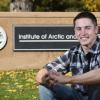Climate & Environment
- <p>A team led by the University of Colorado Boulder has been awarded $9.2 million over five years from the U.S. Department of Energy to research modifying E. coli to produce biofuels such as gasoline.</p>
<p>“This is a fantastic opportunity to take what we have worked on for the past decade to the next level,” said team leader Ryan Gill, a fellow of CU-Boulder’s Renewable and Sustainable Energy Institute, or RASEI. “In this project, we will develop technologies that are orders of magnitude beyond where we are currently.”</p> - <p>An analysis of mineral grains from the bottom of the western Grand Canyon indicates it was largely carved out by about 70 million years ago -- a time when dinosaurs were around and may have even peeked over the rim, says a study led by the University of Colorado Boulder.</p>
- <p>The wild and dramatic cascade of ice into the ocean from Alaska’s Columbia Glacier, an iconic glacier featured in the documentary “Chasing Ice” and one of the fastest moving glaciers in the world, will cease around 2020, according to a study by the University of Colorado Boulder.</p>
 <p>A $20 million remote sensing instrument package built by the University of Colorado Boulder, which is leading a 2013 NASA mission to understand how Mars might have lost its atmosphere, has been delivered to Lockheed Martin in Littleton, Colo., for spacecraft integration.</p>
<p>A $20 million remote sensing instrument package built by the University of Colorado Boulder, which is leading a 2013 NASA mission to understand how Mars might have lost its atmosphere, has been delivered to Lockheed Martin in Littleton, Colo., for spacecraft integration.</p>- <p> </p>
<p>A $20 million remote sensing instrument package built by the University of Colorado Boulder, which is leading a 2013 NASA mission to understand how Mars might have lost its atmosphere, has been delivered to Lockheed Martin in Littleton, Colo., for spacecraft integration.</p> - <p>Some arid lands in the American West degraded by military exercises that date back to General George Patton’s Word War II maneuvers in the Mojave Desert should get a boost from an innovative research project led by the University of Colorado Boulder.</p>
 <p>Matthew Reed didn’t feel ready for college right out of high school. But after five years of military service, he felt more prepared to pursue a college degree.</p>
<p>Matthew Reed didn’t feel ready for college right out of high school. But after five years of military service, he felt more prepared to pursue a college degree.</p>
<p>“Being in the military made me disciplined,” said Reed. “I’m much better prepared and in a much better situation to be in college now.”</p>
<p>Reed, from Broken Arrow, Okla., is a sophomore majoring in geology and anthropology. Because he is an Iraq veteran, his tuition is covered by the Post 9/11 G.I. Bill.</p>- <p> </p>
<p>A new University of Colorado Boulder study shows for the first time that episodes of reduced precipitation in the southern Rocky Mountains, especially during the 2001-02 drought, greatly accelerated development of the mountain pine beetle epidemic.</p>  <p>Veronica Vaida, a professor of chemistry and biochemistry and a fellow of the Cooperative Institute for Research in Environmental Sciences at the University of Colorado Boulder, was inducted into the American Academy of Arts and Sciences this month.</p>
<p>Veronica Vaida, a professor of chemistry and biochemistry and a fellow of the Cooperative Institute for Research in Environmental Sciences at the University of Colorado Boulder, was inducted into the American Academy of Arts and Sciences this month.</p>
<p>She was elected to the academy in recognition of her exceptional achievements in scientific research. Among the other 218 new members elected this year were U.S. Secretary of State Hillary Clinton, actor and director Clint Eastwood, journalist Judy Woodruff and Amazon.com founder and chairman Jeff Bezos.</p> <p>While a new study led by the University of Colorado Boulder shows the risk of human conflict in East Africa increases somewhat with hotter temperatures and drops a bit with higher precipitation, it concludes that socioeconomic, political and geographic factors play a much more substantial role than climate change.</p>
<p>While a new study led by the University of Colorado Boulder shows the risk of human conflict in East Africa increases somewhat with hotter temperatures and drops a bit with higher precipitation, it concludes that socioeconomic, political and geographic factors play a much more substantial role than climate change.</p>


